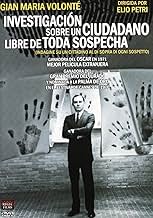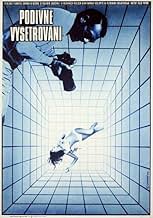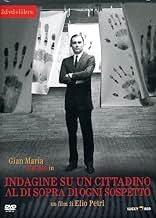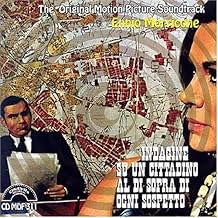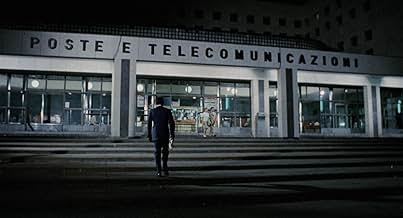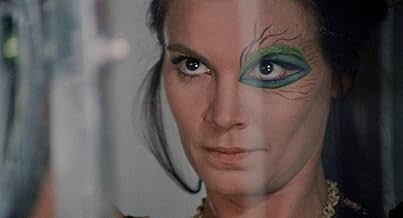Enquête sur un citoyen au-dessus de tout soupçon
A high-ranking police inspector kills his mistress and deliberately plants clues indicating his responsibility for the crime in a sardonic test to prove that he is above suspicion.A high-ranking police inspector kills his mistress and deliberately plants clues indicating his responsibility for the crime in a sardonic test to prove that he is above suspicion.A high-ranking police inspector kills his mistress and deliberately plants clues indicating his responsibility for the crime in a sardonic test to prove that he is above suspicion.
- Won 1 Oscar
- 16 wins & 6 nominations total
Featured reviews
A very original screenplay tells us the story of a respected police inspector who commits a crime and deliberately leaves clues just to find out how big is his reputation of "a citizen above suspicion" . The theme is developed from this single event and becomes an intelligent and provocative reflection about the concepts of authority and institution . While some could wrongly see this movie as a left-wing political one because of the way it depicts police authorities' excessive power , It is really only a fair illustration denouncing the impotence of institutions of making an impartial investigation about their own mistakes . The main theme of the movie rises up a brilliant and paradoxical question : how can the organs which administrate the "Law" condemn themselves without risking their own collapse and negation ? To this question the movie answers with the pessimistic vision that a real justice is an utopia because of human-beings' weaknesses and self-preservative nature . This brilliant reflection is developed in an highly entertaining and smoothly constructed satirical police-story : in fact the movie has an overwhelming "funny" tone especially thanks to Gian Maria Volonte' superb acting in the main role of the "fascistoid" police inspector . The ending will surprise you with the way it reveals the surrealistic nature of the whole topic .
Even if this movie was highly awarded and acclaimed at its time , (1 Oscar for Best foreign film , 1 Nomination for Best original screenplay , won Grand Prize of the Jury and Golden Palm nomination at Cannes Films Festival , 1 Golden globe nomination ) at the present days it has been criminally forgotten . I can only add that I personally consider it one of the best Italian films ever made and one of the most provocative police-stories in the last 40 years . Unfortunately it suffers of a very poor international distribution so , unless you live in Italy , it won't be easy for you to find this movie . But it doesn't matter how hard it will be , it will be worth it .
This movie is definitively about state violence. Even if to a viewer that has no foreknowledge of the police state that was instituted in Italy (with the help of the CIA as the movie alludes to) in order to keep the Communist Party from taking power (the PCI had the biggest following of any parties at that time), the fact remains that the movie is not much more surreal than the socio-political reality facing the film-maker.
Murders and "suicides" (while in police custody) of left-wing political activists and of anarchists are a fact that Elio Petri was painfully aware of. He made a documentary called "Streghi dello stato" "witches of the state" where Jean Maria Volonte and others expose such "suicides". Elio Petri was politically aware and through out his work there is criticism of the right wing of Italian politics (see TODO MORO).
I think that the movie is most powerful once you are aware of the fact that you can be victimized at the hands of an institution, esp. at the hands of an institution that exists only to maintain political order. Once the politicization of the priorities of those institutions that have the legitimate use of violence occurs, than meaningless violence towards the innocent will be allowed if punishing it would impair the political functions of the state machinery. Flora Balkan is perhaps a symbol for the masses, their love of violence and power, their love for the undoing of their freedoms.
A very fine movie that requires some effort, but that is always actual - thanks to an interesting narration of human nature. The movie does have it's flaws and i the action is not as invigorated as one expects it to be after the first 15 minutes, neither is the camera work at the level it has to be for this movie to be the greatest ever but it is still a hell of a great movie.
Whether or not you agree with this movie's negative portrayal of state violence and of that primal attraction that violence has (explored in a marvelously Mediterranean style in this movie) for so many could make the difference in how much you are puzzled by the movie. If you see it a a satire of power and violence - it might work.
One man, called Il Dottore, is holding the sword. He was the former Head of Homicide Squad and leads now the Political Bureau of the Italian Security Court. His speech in the beginning of the film, clearly announces him as a man with palpable fascist tendencies, although the overuse of the word 'fascist' kind of weakens its meaning. This man, incarnated by Gian Maria Volonte, exults the value of a powerful state above any consideration of individual rights. The state must be powerful, authoritarian and any ideas that threaten Law and Order, should be mercilessly fought. It's too simplistic to call this 'fascism', some would say fascism was born in Italy, which would explain that the ideas of a man like Il Dottore could be impregnated by a certain fascist vision but they'd be forgetting that Italy is also the country of Machiavelli, and the whole plot of this psychological political thriller could be considered as a deep, Machiavellian character study.
Il Dottore is fascist in his beliefs and Machiavelian in his acts, two contradictions that totally cancel each other out and makes him more of a very interesting pathological case of egomania. The man wants to prove that the very system that maintains Law and Order, Police and Justice, is flawed because it ensures the existence of citizens beyond suspicion. This man wants to denounce the main obstacle, the thing that makes his job ethically useless. The mission sounds noble... except that the way he chose to prove his point is the act of a maniac. A crime to denounce, to make the point he himself incarnates, that there are some citizens above suspicion. So high above this suspicion that they can leave clues to denounce themselves without never being worried. Because people believe in men who incarnate order. Power's aura seems more efficient than its use. Power relies on its own abuse.
And that's the theme of the film. What is power? Il Dottore incarnates it with such charisma and virile magnetism that whatever comes off his mouth sounds like the truth. If he says he's guilty, it can't be anything but irony or sarcasm. The simple thought that he could be guilty of the crime he committed sounds like a blasphemy. Indeed, the power is a deified notion. And like the power of God is perceived in our everyday life, the same goes for Law. Order is real, and can't be based on abstraction. The paradox is that an abstraction is not palpable enough to be respected. Fear of punishment controls people more than interests, as said Machiavelli. Therefore, it is no surprise that socialism is considered as an escapism from individual interests and therefore can understand only one language : repression. Il Dottore handles the questioning of the left-wing activists just as if he had personal reasons to fight them, because they're the most likely people to legitimate the use of repressive violence.
Indeed, it is personal. Jealousy, weakness, humiliation, power is represented by men, who are flawed. This is a brilliant character study of a man using power as an artifice to disguise his weaknesses. He's the Law but he's a citizen, he's power and he's powerless. His interactions with his victim totally deconstruct the character, and extinguish the aura and prestige he incarnates for his men. With this woman, his authority is like the toy the little boy proudly shows. Power allows him to run a red light or share some gross crime-related experiences, so voyeur it sounds childish. They're big children but they have the power. So, whom the power belongs to ? Women? Anarchists? Who's the leader? the system ? No, what leads the world is only human judgment ... The truth is in its appearance and this is what guides human perception.
Il Dottore denounces these fallacious perceptions in such an original way, we also can't believe this man has this status and is so respected, which makes us question the legitimacy of some our leaders ... after all, men are men, and behind every great man, there's a woman, and who really knows how these so-called great men behave with these women? Gian Maria Volonte gives us a hint through an extraordinary performance. In the cinematic world of character studies, Il Dottore is a living paradox highlighting our own weaknesses as men who believe in a system of powers, or our owns for the luckiest ones. His charisma makes him all the more pathetic in some key scenes and his pathos more admirable in some others. Elio Petri's investigation is a fascinating political thriller whose introspectively paranoid feeling is sublimated by Ennio Morricone's score.
"Investigation of a Citizen Above Suspicion" is an intelligent masterpiece denouncing the paradoxical nature of Law where the holders of the sword tend to fight those who hide themselves behind the shield while the shield protects only those who use the sword. Gian Maria Volonte is the soul of this contradiction.
The movie portrays the moral corruption of Italian police and politics in the 1970's, with totalitarian tactics wrapped in patriotism. The movie's lead policeman is swept up in the power of position. Sadly, it's only too easy for me to believe his ability to use his position and power to manipulate people and place himself above "the law".
The movie "looks" Italian and 1970's, with stark concrete and flat colors, which appealed to me. The story builds well, jumping backwards to fill in details, to climax in an alternate possible ending, very believable. I highly recommend it.
Did you know
- TriviaFirst part of the "Trilogy of Neurosis", also including La classe ouvrière va au paradis (1971) and La propriété, c'est plus le vol (1973).
- Quotes
Il Dottore - Former head of homicide squad: The people are underage, the city is sick. Others are tasked with educating and curing this. Our duty is to repress it! The repression is our vaccine! Repression and civilization!
- Alternate versionsThe subtitled American version distributed by Columbia has slight differences in the credits. The Italian version opens with blank white-on-black credits (as many other Petri films do). The American version projects the credits onto the opening scene with the Dottore walking around the street. Both the opening and the closing credits (including the film's title and the Kafka quotation) are translated to English as well.
- ConnectionsEdited into Colpiti al cuore (2019)
- How long is Investigation of a Citizen Above Suspicion?Powered by Alexa
Details
- Release date
- Country of origin
- Language
- Also known as
- Investigation of a Citizen Above Suspicion
- Filming locations
- Production company
- See more company credits at IMDbPro
Box office
- Gross US & Canada
- $265,470
- Runtime1 hour 55 minutes
- Sound mix
- Aspect ratio
- 1.85 : 1
Contribute to this page




